Forum tip: Always check when replies were posted. Technology evolves quickly, so some answers may not be up-to-date anymore.
-
 IvanS
3MSP360 RMM 1.4
IvanS
3MSP360 RMM 1.4
With Support for macOS, Scheduling Windows Updates and PowerShell Scripts, Tasks Management, PowerShell Script Library, and RMM Alert History
Summary
By adding support for macOS, new scheduling for RMM group actions and implementing a script library, MSP360 RMM makes another step to a new level in its development.
A schedule for group actions, RMM tasks management, a script library, and a beta version of RMM for macOS are designed to make IT administrators' lives simpler and give them fewer worries.
1. RMM for macOS
MSP360 is excited to announce the long-awaited and much requested support for macOS endpoints.
This is the first version of RMM for macOS, and while it lacks some features of its Windows counterpart, it is a first step in the right direction.
Currently, we support three macOS versions in MSP360 RMM 1.4 (beta): Big Sur 11.0, Monterey 12.0, and Catalina 10.15.
From the Remote management page, you can monitor the performance of macOS computers, such as disk space, CPU and memory consumption.
Colored indicators give you a clear idea of the health of your devices.

Detailed information regarding the health and performance of macOS computer is provided in the RMM info panel in the following sections.
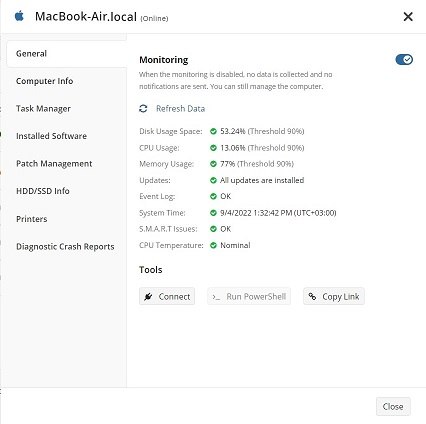
Check out the help section for more information on the features supported by the first macOS version of RMM.
2. Scheduled RMM tasks
MSP360 RMM version 1.4 introduces RMM tasks designed to simplify and increase the efficiency of IT administrators' daily tasks.
Tasks are recurring group actions that can be executed multiple times on a group of selected computers with the set-and-forget principle.
Click the New Group Action task in the RMM Group Actions menu to begin creating a task.

RMM group actions can now have three types of execution:
- No Schedule (run manually)
Creates a group action that will not be executed immediately, but needs to be run manually.
- Run Once
It creates a group action that is executed immediately on all online computers selected.
If a computer is offline at the time of the task execution, it gets a pending state and executes that action as soon as it becomes online.
- Specific Date
Allows you to create a recurring task that starts according to a specific schedule. The system executes the task based on the local time on the endpoint.
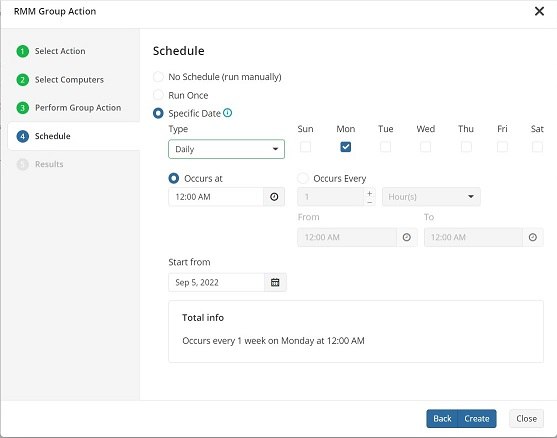
From now on, you won't have to wait when a computer becomes online, a Windows Update is applied, or a script is executed.
You only need to create a task in the RMM Group Actions wizard, and the system will take care of everything else.
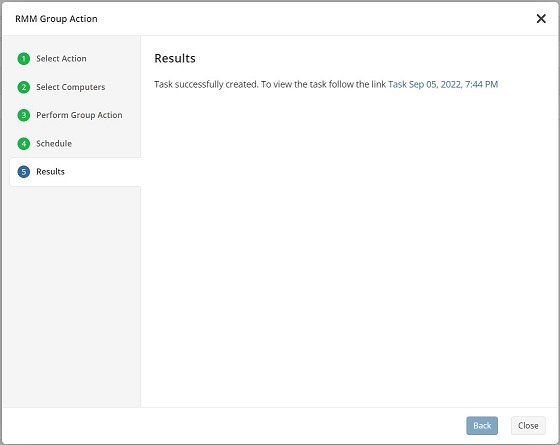
3. Group Action Tasks page
For a quick overview of your RMM tasks and their results, click on the Group Action Tasks section under the RMM Group Actions menu.
There, you can view all existing RMM tasks, get detailed information about their completion, and create new tasks if necessary.
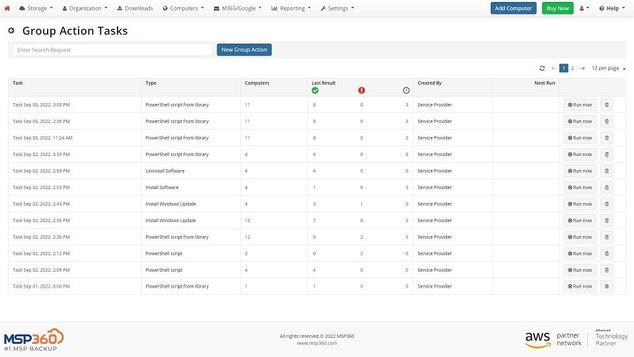
By clicking the task title, a side panel will appear with detailed information about it and a list of computers involved.
A colored indicator will identify the computers where a problem occurred during the task execution.
An offline computer will have a pending task, which means that it will be awaiting the time when it becomes online before being executed.
Clicking on a computer will bring up the last result of the task completion.
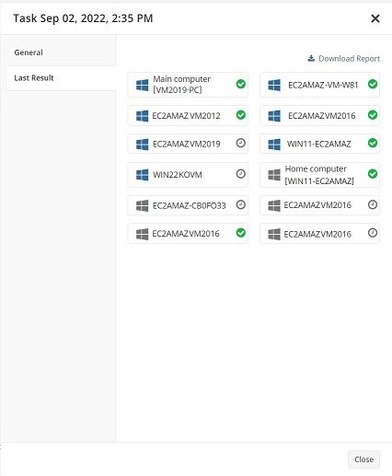
4. Script library
MSP360 RMM 1.4 introduced Script Library, a feature designed to assist IT administrators with everyday IT task automation using PowerShell scripts.
It is now possible for any Administrator to create a script library with frequently used PowerShell scripts that can be stored privately or shared with colleague working on the same managed console.
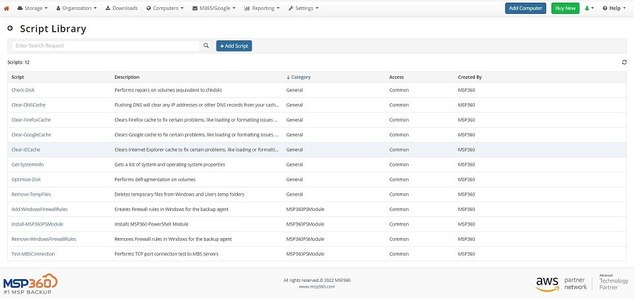
MSP360 RMM 1.4 includes a number of PowerShell scripts prepared by MSP360 to handle some basic tasks, such as cleaning temporary files or a disk check. In addition to them, we added an easy way to add new scripts to the library.
The Add script button will launch a wizard that will allow you to upload your own script to the desired category and describe its purpose.
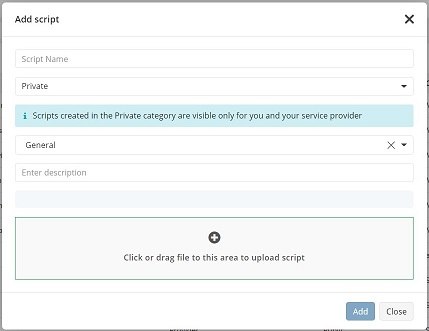
There are three script categories in the Script Library:
General
A collection of common PowerShell scripts prepared by MSP360 to simplify common Windows maintenance tasks. No modifications can be made to these scripts.
Read-only access to these scripts is granted to anyone who has access to the Managed Backup Service account.
Private
It is common for IT engineers to perform the same daily routine tasks in a particular way and to take on a variety of particular tasks during their workday.
Administrators can create their own script repository in the Private category so they can use it in specific scenarios and for specific purposes.
Public
By sharing scripts for daily IT tasks between its administrators, the Public category makes co-working within an administrative console even more efficient.
Every Administrator with access to the Managed Backup Service account can view and use the scripts in this category.
5. RMM Alerts history page
In response to multiple customers' requests, MSP360 now provides a detailed overview of all events that have occurred on the monitored devices in the past few months. RMM 1.4 brings a new page dedicated to RMM alerts history. It allows you to create a list of all issues that have occurred in the past week or even a month or so. Different types of filtering make it easy to sort out all alerts on a specific computer by type and status to find an event that happened during a particular period of time or date.
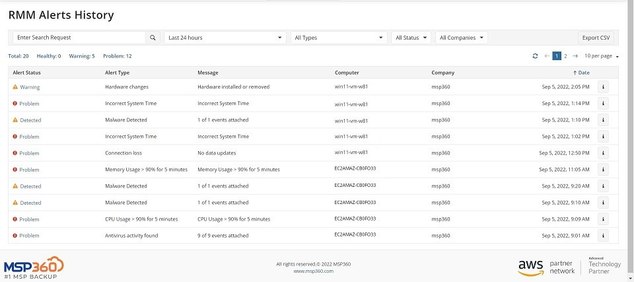
Welcome to MSP360 Forum!
Thank you for visiting! Please take a moment to register so that you can participate in discussions!
Categories
- MSP360 Managed Products
- Managed Backup - General
- Managed Backup Windows
- Managed Backup Mac
- Managed Backup Linux
- Managed Backup SQL Server
- Managed Backup Exchange
- Managed Backup Microsoft 365
- Managed Backup G Workspace
- RMM
- Connect (Managed)
- Deep Instinct
- CloudBerry Backup
- Backup Windows
- Backup Mac
- Backup for Linux
- Backup SQL Server
- Backup Exchange
- Connect Free/Pro (Remote Desktop)
- CloudBerry Explorer
- CloudBerry Drive
More Discussions
- Terms of Service
- Useful Hints and Tips
- Sign In
- © 2025 MSP360 Forum










